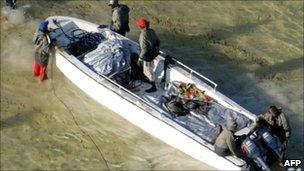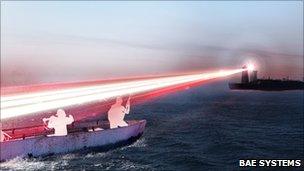Laser cannon set to blind pirates
- Published

International naval forces have not stopped pirates from expanding their area of operation
Sailors may soon have a weapon in their battle against sea-borne raiders: an anti-pirate laser.
BAE Systems has demonstrated its new laser system, which can temporarily blind would-be attackers.
The system would prevent pirates from being able to aim their weapons at targets, BAE claims.
But further safety testing is needed before such a system could be commercially deployed.
BAE said it has developed a low-cost laser distraction system that can travel through the sea air while being housed onboard a moving ship.
At distances of between 1.2km (0.75 miles) and 1.5km (0.85 miles), the laser beam acts as a warning signal, letting the pirates know they've been spotted, said Brian Hore of BAE.
"Today's pirates tend to be opportunistic. If they know they've been spotted, they're likely to look for an alternative target," he told BBC News.
Blinding light
At closer ranges, the green laser beam will dazzle them, making it difficult for the pirates to use weapons of their own, said Mr Hore.
Green lasers - which have been shown to interfere with eyesight - have been used by the US military in Iraq and to temporarily blind targets.

Artist's impression of BAE's laser distraction system
The challenge has been to develop a system that can be used safely - but effectively - over long distances at sea, said Mr Hore.
Weapons designed to cause permanent blindness are banned by a United Nations protocol.
BAE has conducted a series of optics experiments to demonstrate that its distraction laser operates within known safety limits, said Mr Hore.
Human tests would have to be conducted before the system is made commercially available, he added.
Any commercial system would see the laser cannon integrated with BAE's existing targeting systems.
This would allow it to adjust the intensity of the laser beam to account for the target's distance and atmospheric conditions, Mr Hore said.
The International Chamber Of Commerce's International Maritime Bureau said there were 430 pirate attacks worldwide reported last year, up from 406 in 2009.